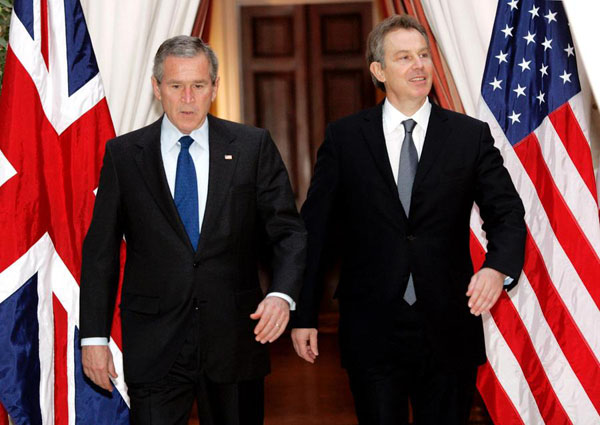 |
|
US President George W. Bush (L) and British Prime Minister Tony Blair walk together from their meeting at the US Embassy in Brussels in this February 22, 2005 file photo. [Photo/Agencies] |
An inquiry conducted by former British civil servant John Chilcot into the United Kingdom's role in the 2003 US-led invasion of Iraq blames Tony Blair, then British prime minister, for dragging the UK into the war in Iraq on the basis of flawed intelligence. The 2.6-million-word inquiry report says the Blair government overstated the threat posed by Saddam Hussein, then Iraqi president, took military actions before diplomatic alternatives were exhausted and had "wholly inadequate" plans for the aftermath.
The report, however, does not comment on the legality of the conflict, which was waged without the authorization of the United Nations Security Council.
Although promising to "take full responsibility for any mistakes, without exception or excuse", Blair insists his decision to take the UK to the war in Iraq has made the world "better and safer".
The truth is, the war claimed the lives of 179 British soldiers, thousands of American soldiers, and hundreds of thousands of Iraqi civilians, dividing the country into factions and causing endless unrest. Worse, the so-called weapons of mass destruction were never found in Iraq.
The war also failed to "remold" Iraq as an exemplary democracy in the Middle East, as tensions between disputing forces remain high and the political vacuum has given rise to terrorist groups like the Islamic State. Moreover, the ouster of the Saddam Hussein government, which left more than 1 million Iraqis (mainly civilians) homeless, could be seen as a major cause of the ongoing refugee crisis in Europe.
Although investigations have been launched in Britain and elsewhere into allegations against the British troops' role in Iraq, which are basically about genocide, crimes against humanity and war crimes, they are unlikely to hold all the culprits accountable.
The Iraq Historic Allegations Team, an organization formed by the British government in 2010 to investigate allegations of abuse and torture by British soldiers in Iraq, is reportedly reviewing more than 300 allegations of murder and over 1,300 serious sexual harassment and abuse cases. The International Criminal Court, too, is considering launching a formal investigation into Britain's alleged war crimes.
But whether the British soldiers who committed crimes in Iraq will stand trial at home or in the ICC remains unclear, because the ICC only plays a supplementary role in Britain's domestic criminal jurisdiction. In other words, the ICC can only intervene when Britain is unwilling (or doesn't have the capability) to investigate or prosecute the wrongdoers.
Holding accountable former state leaders such as George W. Bush, then US president, and Tony Blair is even trickier. Apparently, by invading the country without the consent of the UN Security Council, they violated the ban on the use of force and threat against another country, which is a core principle of the UN Charter, and committed the crime of aggression under the Rome Statute, which governs the ICC.
But both Bush and Blair are unlikely to face criminal charges. US soldiers will enjoy the same immunity, because Washington has not ratified the Rome Statute and signed immunity agreements with some countries.
It is a shame that no one-as yet-h(huán)as been held responsible for the Iraq war, arguably the most blatant violation of the rule of law in the post-Cold War era, although hundreds of thousands of people have fallen victims to the whims of Blair and Bush.
There is a lesson in all this for countries in the Asia-Pacific, including both China and ASEAN countries, that is, they should stay alert to US intervention in regional affairs.
As the Chilcot report shows, the US may resort to similar lies to instigate conflicts and clashes in China's neighborhood to propel its "pivot to Asia" strategy. To prevent the US from succeeding in its dirty designs, all countries in the Asia-Pacific need to make peace and stability their priority instead of picking sides over security issues.
Liu Haiyang is a research fellow at the Collaborative Innovation Center of South China Sea Studies of Nanjing University, and Zhao Yishui is a research fellow with the South China Sea Institute of Xiamen University.